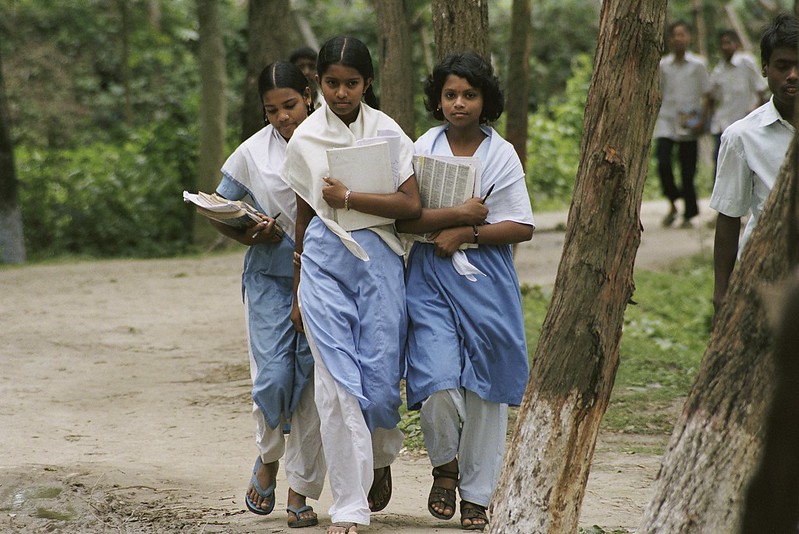Celebrate International Literacy Day by Taking Action on the READ Act
Today is International Literacy Day, founded by UNESCO in 1966 to highlight the importance of foundational literacy and numeracy (FLN). As kids around the world head back to school, it’s time to take action to protect the rights of all children to a quality education and bright future.
We’ve made progress in the past few decades, but COVID-19 and other global crises have stalled and even reversed the global education community’s momentum. Today, 773 million adults still lack basic reading and writing skills. The majority of these adults are women, and almost 80% live in Southern Asia or sub-Saharan Africa.
Kids are also experiencing rising rates of illiteracy. More than 616 million children are still out of school, and up to 70% of 10-year-olds in low- and middle- income countries are unable to read a simple text. The World Bank estimates that this generation of students will lose $17 trillion in lifetime earnings because of their disrupted education.
Around the world, girls, children with disabilities, and poor children face the greatest barriers to education and the most severe effects of illiteracy. When educated, girls are three times less likely to marry before age 18, and their future wages increase by an average of 20 percent each school year. FLN is a human right, and we cannot leave any students behind.

An Opportunity for Global Leadership
In a few weeks, world leaders are meeting in New York City for the United Nations Transforming Education Summit (TES). TES is a great opportunity for lawmakers to discuss the severity of the global learning crisis and strategies to solve it. We’re asking the U.S. government to continue their support for the Global Partnership for Education (GPE). GPE aims to address the UN’s FLN targets, including ensuring that all children complete free, equitable, and quality primary and secondary education. They also tackle education disparities based on gender, race, and disability. Education Cannot Wait (ECW) also desperately needs U.S. funding in order to provide education to children affected by conflict, climate disasters, and other crises. ECW estimates that 222 million school-aged children affected by crises are in urgent need of educational support.
Supporting opportunities for lifelong learning allows countries and societies to prepare for and adapt to changing economies and environments.
— USAID Education (@USAIDEducation) August 18, 2022
@USAID Education Policy pic.twitter.com/00lDu9UJx4
During TES, government officials, educators, youth, and civil society advocates from around the world will pledge their commitment to address global learning gaps. The main goal is to empower governments to accelerate access, learning outcomes, and gender equality through equitable, inclusive, and resilient education systems. We know that marginalized communities disproportionately experience barriers to FLN and basic education. But there are policies and programs that can prevent the educational backslide we’ve seen during COVID.
For example, the Commitment to Action on Foundational Learning is a multilateral statement developed by UNICEF, USAID, FCDO, the Bill and Melinda Gates Foundation, the World Bank, and UNESCO. It requires urgent and decisive actions to reduce the amount of children under 10 unable to understand a simple text in half by 2030. The U.S. has long been a leader on global education, but more advocacy and funding is necessary to achieve these bold goals. Endorsing this Commitment to Action would be an important step for the Biden administration. Without significant policy changes, millions of children will lose their human rights to basic education and FLN.
Take Action
Basic education is key to ending poverty, and your voice can make a difference. You can take action by joining other advocates and UNESCO on International Literacy Day, September 8th, for a Webinar on Transforming Literacy Learning Spaces, sponsored by the government of Côte d’Ivoire. Speakers will discuss the fundamental importance of literacy learning spaces to build resilience and ensure quality, equitable, and inclusive education for all.
There’s also a bipartisan bill working its way through Congress that would have a huge impact on the U.S.’s global education policies. Reauthorizing the READ Act will make U.S. foreign aid more effective and maintain our government’s commitment to global education.
📣Join us for #GlobalEducationAdvocacyDay & take action: Please urge Congress to support and co-sponsor the bipartisan, bicameral #READActReauthorization today❗️
— GCE-US (@GCE_US) July 19, 2022
➡️ https://t.co/0eAnUhgAS5 pic.twitter.com/z0LvuRvgsA
The bill currently has 53 cosponsors in the House, and just 9 in the Senate. We know that our advocacy is working, because the House passed the bill through committee in early August. But we need you to urge your members of Congress to join as cosponsors. You can check if your members of Congress are supporters, and use #READActReauthorization, #InternationalLiteracyDay, and #LiteracyForAll to join the global education community in calling on Congress to pass this crucial bill. Gaining cosponsors will show Congressional leadership that this is a critically important bill that will affect millions of students around the world.